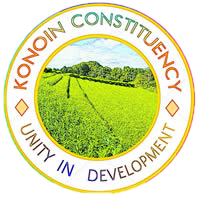AGRICULTURE SECTOR AT A GLANCE
TEA FARMING
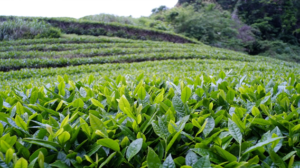
Tea Leaves- Clone 15/10
Tea is major cash crop that is grown in Konoin Constituency and in Kenya at large. It is the major foreign exchange for the country. Most tea produced in Kenya is black tea, green tea, yellow tea and white tea produced on order by major tea producers.
Most Kenyan tea is grown in highlands west of Rift valley at a high altitude between 1500 to 2700 Meters. Konoin falls in this region and the leading constituency with highest number of tea plantation in hectares in the region.
TEA CLONES
Clones of tea in Konoin
The most common tea clones in Konoin are:
|
|
Soil type in Konoin for tea production
Konoin lies in the highland west of Rift Valley and rich in red volcanic soil which is favorable for best Kenya tea with its distinct bright color and aromatic flavor, thanks also to the tropical climate in the region. Part of the area has some loam soil which is good for black tea.
NUMBER OF TEA FACTORIES IN KONOIN
The number of factories managed by KTDA has risen in the last few years due to increase in production of tea. We have five fully established and run factories within Konoin namely,
PRIVATE AND MULTINATIONAL FACTORIES
The total number are Seven (7) private factories owned within Konoin of which almost 70 percent of multinational companies of James Finlay and Unilever are found in Konoin and have established tea factories. Under Unilever Company we have the following factories,
While for James Finlay it includes;
We also have Changoi tea factory under Williamson and latest Siomo tea factory as a privately-owned factory.
OTHER FARMING ACTIVITIES
DAIRY FARMING-Milk production
We don’t have the real figure of milk production in the constituency since most of the suppliers are sold without any updated data. But according kokiche cooling plant they received about 400lts-500lts in the past four months. From the ground analysis Konoin produce almost 1500lts per day.
Cooling plant in Konoin
Konoin is endowed with one milk cooling plant KOKICHE cooling plant where famers supply their milk from the neighboring sub-counties of Bomet east and sotik which are major milk producers.
Feeding information
Most dairy farmers in Konoin feed their dairy animals with forage which is mainly grass in line with their income level. The lands have become smaller forcing them to plant Napier grass, maize straws and wheat straws to supplement their diet. Lactating cows require minerals such as dairy lick, Mack lick super and Unga which are high in phosphorus nutrients. In periods of high rainfall grass sprout more faster and water carries away most of their nutrients farmers therefore are advised to feed their animals with nutrient containing magnesium which increases minerals uptake in animal bodies.
Dairy farming initiatives
The sub county through the ministry of agriculture administered Artificial Insemination (AI) of cows at subsidized price of ksh 400 and ksh 1200 for hybrid vigor’s. They also promote extension services to farmers who wish to invest in dairy farmers in providing information about construction structures for cattle and dips
AI Services
Artificial insemination is a very common in today agriculture industry in develop world especially for breeding dairy cattle. These provides economical means for livestock breeder to improve the herds utilizing males having very desirable traits.
In Konoin we have an AI office with officers who are working within the constituency to administer the services. the county government have subsidized prices for AI service
MAIZE FARMING
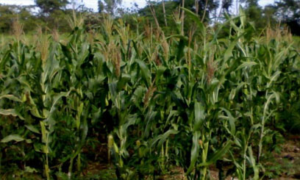
Maize Field at Kaptebengwet- Konoin Constituency
Maize is is the stable food in Kenya. Large as well as small scale farmers produce the crop and large percentage of the population depend on maize farming as an income generating activity. In Konoin maize is planted on small farms for mostly domestic consumption since nearly 70% of the land is occupied by tea plantation.
Reasons for decline in maize farming in Konoin Constituency
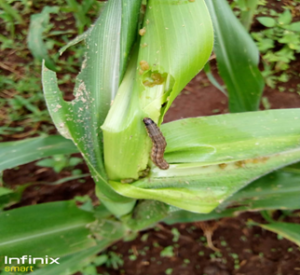
Army Worm in Maize Crop-Konoin Constituency
Since early 2000 most of maize farmers have abandoned maize production due to high cost and opted to tea farming. Unpredictable farm inputs prices weather patterns and cost of production are some of the factors pushing them out of maize production. The latest common diseases affecting maize in Konoin is called lethal necrosis MLND and fall army worm [FAW] which attack the leaves and stem.
Maize varieties planted in Konoin
Highland maize breed are recommended for Konoin constituency. Its medium and high altitude of (1500-2100 meters) above sea level where day time temperature seldom exceed 280 c during growing season and where the night temperature drop to as low as 80 c . Rainfall requirement ranges from 800 to 1500mm
| Varities | Yield/acre( 90kg) | Period to maturity (Days) |
| H6218 | 56 | 160-210 |
| H6213 | 52 | 160-210 |
| H6210 | 50 | 160-210 |
| H624 | 48 | 160-210 |
| H628 | 46 | 160-210 |
| H626 | 42 | 160-210 |
| H625 | 40 | 160-210 |
| H614 | 38 | 160-210 |
A lot of research has been going on how to improve the best varieties of maize and also those that can sustain the diseases. The latest variety which according to the constituency agricultural extension officer is the “777” one variety that is doing good harvest at the moment
AVOCADO FARMING
Grafted avocadoes Hass and fuerte varieties were introduced and subsidized by the county government of Bomet at ksh 60 and 50 respectively. The sub-county received subsidized avocados and tissue culture on an incentive to encourage farmer’s plant in order to increase food security and nutritional condition created by overreliance on tea and shrinking of land areas to plant.
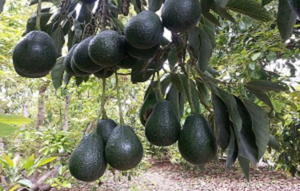
Avocado Tree in Tobilas Farm-Kaptebengwet Konoin Constituency
Avocados grow well in equatorial climate ideal in Konoin. The sub county is in the process to export the produce via freight and sea to the customers in Europe where weather conditions are not favorable.
Majority of Hass varieties produced in Kenya 70% are exported to France while 15% goes to the UK with balance distributed through EU countries Switzerland and Scandinavian countries
The matured has variety produce twice annually at an average of 3500 fruits per cycle and their price ranges between ksh 5 per fruit and ksh 12 in the market in a good day
BANANA FARMING
The grand naive is highly yielding Cavendish variety and is very popular in Konoin. It grows a height of 6.5 to 7.5 feet. The plant bunch can be harvested within 12-13 months from the date of planting. Each banana will be having 10-12 hands with 175-225 number of fruits. The fruit are delicious to eat and nutritious too. Farmers in the the sub-county are encouraged to embrace the same to improve the households nutritionally and financially. Most of the banana farmers sell their produce in the local markets
EXTENSION SERVICES
Vertinary officers
The major functions of a vertinary officers in Konoin include the following;
- Disease control –these involve prevention of diseases in livestock through routine vaccination on livestock on the common and noticeable diseases like Foot and Mouth Diseases [FMD], East Coast Fever [ECF], rabies on dogs and cats and other common diseases in the constituency.
- Diseases surveillance- they monitor and report any traces of diseases and movement of livestock. These helps farmers keep animal free from diseases hence boost their production.
- Meat inspection –their duty is to inspect and give good bill of health to any animal slaughtered for human consumption.
- AI services- they educate dairy farmers on the important of AI services. These services have been subsidized by the county government to eliminate the use of bulls which downgrade the standard of dairy cows. The use of AI also eliminates inbreeding diseases among dairy cows.

